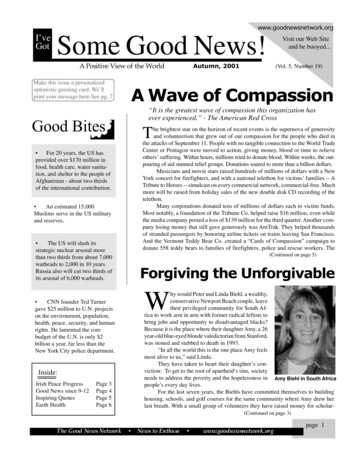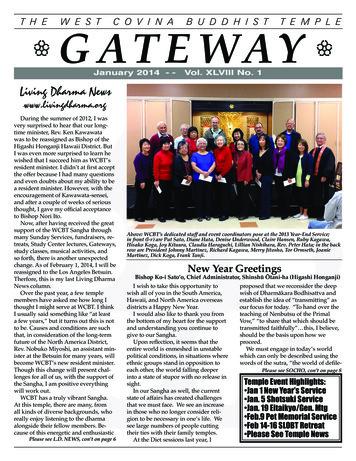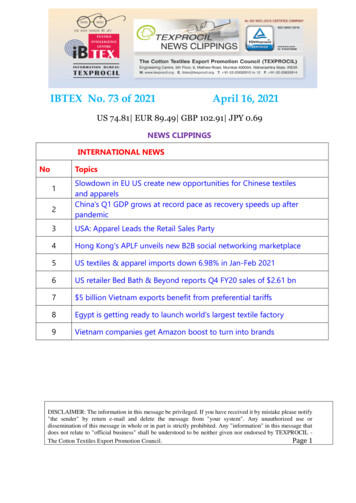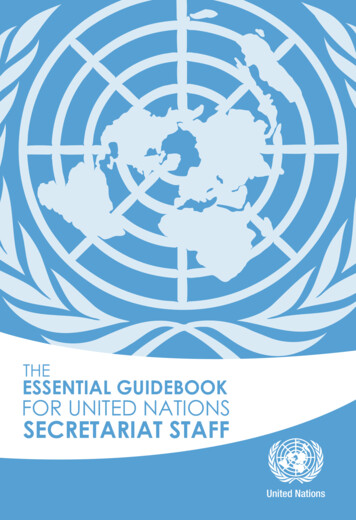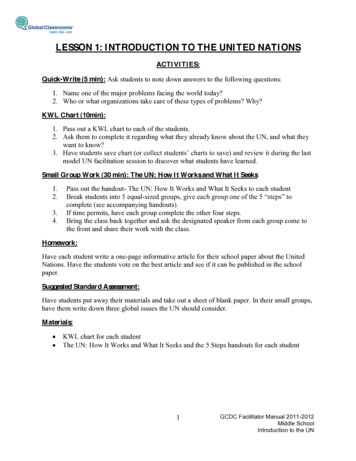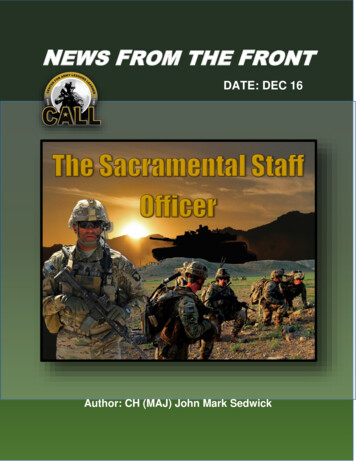
Transcription
NEWS FROM THE FRONTDATE: DEC 16Author: CH (MAJ) John Mark SedwickAPPROVED FOR PUBLIC RELEASEDISTRIBUTION UNLIMITED
The Sacramental Staff OfficerBy CH (MAJ) John Mark SedwickArmy South Plans/Operations ChaplainCH (MAJ) John Mark Sedwick serves as the Operations/Plans Chaplain at Army South (JointBase San Antonio-Fort Sam Houston, San Antonio, TX). The opinions expressed in this articleare his own and do not constitute an official position of the United States Army or the UnitedStates Army Chaplain Corps.“The world is a book, and those who do not travel read only a page.”Saint AugustineAs the Plans/Operations Chaplain for Army South, I enjoy the privilege of travelingextensively in Central and South America to coordinate religious support with partner nationArmy chaplains during multinational exercises and humanitarian assistance/disaster reliefoperations, and therefore I have been blessed to read many pages from the metaphorical bookthat Saint Augustine describes in the above quote. Most recently I accompanied an Army Southcontingent of approximately 40 personnel to Santiago, Chile to participate as part of theCombined Forces Land Component Commander (CFLCC) element of the multinational exercise,PANAMAX, from 24 July to 7 August 2016. My mission included providing religious support toArmy South personnel and, just as importantly, establishing a productive working relationshipwith a Chilean Army Chaplain to advise the Commander and respond to injects involvingreligious support at the CFLCC level. My Chilean counterpart, a 62-year-old Roman Catholicpriest, fit the description of the prototype partner nation Army Chaplain that I routinelyencounter in Central and South America: a dedicated, well-educated, and overworked and multitasked servant leader who quite capably fills the sacramental role of bringing God to Soldiersand Soldiers to God, but struggles to embrace the role of a staff officer who advises hisCommander on matters of religion, ethics, and morale. And my first challenge duringPANAMAX in Santiago, Chile entailed the same challenge I frequently face when interactingAPPROVED FOR PUBLIC RELEASEDISTRIBUTION UNLIMITED
with partner nation Army Chaplains for the very first time: to convince my counterpart comradenon-combatant that I am also a dedicated, well-educated, and overworked and multi-taskedservant leader who struggles to thread the needle between sacramental and staff officerresponsibilities.CH (MAJ) Gutierrez, who in addition to his duties serving as the Command Chaplain fortwo Chilean Army divisions, also teaches every evening at a nearby Santiago seminary. Imentioned earlier that Chaplain Gutierrez is well-educated, and he has in fact studied above andbeyond the Masters of Divinity level in Germany, in Israel and at the Vatican. He speaksSpanish, Italian and German fluently. CH Gutierrez normally wears a black shirt and whiteclerical collar as his “uniform,” and spends his days (when not participating in PANAMAX withhis wild and crazy Lutheran Church—Missouri Synod counterpart) fighting the rigors ofSantiago traffic to visit the Soldiers serving in his two divisions. The Chilean Army Soldiersparticipating in PANAMAX (and indeed all of the partner nation Soldiers who descended uponSantiago, Chile from Belize, Peru, the United States, Panama, Jamaica, Canada, Guyana,Argentina, Colombia, Brazil, El Salvador, Guatemala and the Dominican Republic) rejoiced atthe opportunity to receive a blessing from a Roman Catholic priest on a daily basis as eachsection from G-1 to G-9 reacted and responded to the stressors of new injects and requirementsplaced upon them by higher headquarters.Because all Chilean Army Chaplains are Roman Catholic priests, Chaplain Gutierrez didnot know what to expect from a Lutheran Church—Missouri Synod pastor, and he politely butresolutely interrogated me about the value of my Masters of Divinity degree. Upon learning thatmy seminary education consisted of four years of study (including Hebrew and Greek immersionin order to read the Old and New Testaments in their original languages), he invited me toAPPROVED FOR PUBLIC RELEASEDISTRIBUTION UNLIMITED
participate in a daily morning prayer office for the Soldiers and civilian employees in thePANAMAX headquarters complex. And indeed each morning Chaplain Gutierrez and I wouldtake turns attending the Commanding General’s Battle Update Brief (BUB) and offering theMorning Prayer in Spanish to our multinational forces attending PANAMAX. As I have alludedto earlier, Chaplain Gutierrez initially shied away from attending the BUB because he was notaccustomed to the role of fielding questions from the Commanding General about religioussupport. I encouraged Chaplain Gutierrez to take the initiative to brief his general because aChilean Army Lieutenant General was serving as the Combined Forces Land ComponentCommander for the first time during PANAMAX, and the daily BUB provided a wonderfulopportunity for both the Commander and his Chaplain to grow comfortable in offering andreceiving guidance from each other.Before describing the evolution of this relationship further, it’s important to examine theexpanding role of the Chilean Army in the hemisphere during the last two decades. Chile hasconsistently provided a brigade combat team to deploy to Haiti as part of the United Nationssanctioned peace and stability operations there. The Chilean military leadership elected toembrace NATO doctrine after their first deployment to Haiti in order to communicate andoperate more efficiently with other partner nation armies serving in this same mission. Theiradoption of NATO doctrine impacted all missions conducted by the Chilean Armed Forces, and Iexperienced their fluency with NATO doctrine firsthand while attending the Command GeneralStaff Officer College (CGSC) at the Western Hemisphere Institute for Security Cooperation(WHINSEC) at Fort Benning, GA from June 2014 to June 2015 with a number of extremelyintelligent Chilean Army Officers, including students, instructors and the Deputy Commandantat WHINSEC. Indeed, the Chilean Army commitment to NATO doctrine provided ChaplainAPPROVED FOR PUBLIC RELEASEDISTRIBUTION UNLIMITED
Gutierrez and I with the capability to navigate through some uncharted shoal waters that, up untilnow, Chaplain Gutierrez had neither contemplated nor confronted.Prior to the official commencement of PANAMAX (while all participants attendedacademics training), Chaplain Gutierrez and I received word that we would be part of the J-1section. It is also common practice in the United States Army to place the Unit Ministry Team(Chaplain and Chaplain Assistant) under the administrative control of the G-1 or S-1, so thisdevelopment was not a new challenge for me. Therefore, our first task was to politely but firmlyexplain to the J-1 (a very capable Lieutenant Colonel from Peru) that we did not work for him.Joint Publication 1-05, “Religious Affairs in Joint Operations,” describes the Chaplain as a“special staff officer, the chaplain advises the commander and other staff members on moral andethical decision making, on morale as affected by religion, and personal issues.” With the initialchallenge of establishing the independent role and relationship of Chaplain Gutierrez with hiscommander accomplished, the hard work of religious advisement to the commander on adoctrinal matter soon emerged.Lieutenant General Chamorro, the Chilean Army General who served as the CFLCC,thoroughly appreciated and enjoyed the opportunity to interact with Chaplain Gutierrez and I ona daily basis and displayed a genuine interest in the U.S. Army practice of providing chaplainsfor many different faith groups. Unfortunately, this “genuine interest” compelled him toannounce during an afternoon Commander’s Update Brief that his chaplains would providereligious support to displaced civilians who, as part of the exercise, were forced to leave theirhomes to flee the violence perpetrated by the guerillas who operated in an area adjacent to thePanama Canal. During the BUB that took place the very next morning, I tactfully explained thatjoint doctrine restricts religious support provided by military chaplains to their military membersAPPROVED FOR PUBLIC RELEASEDISTRIBUTION UNLIMITED
and to authorized civilians. I further described the benefit of coordinating religious support withlocal religious leaders and Non-Governmental Organizations (both of whom would maintain anenduring presence long after our Soldiers had re-deployed). The Chilean Army attorney affirmedthe validity of my presentation of joint doctrine, and the matter was settled without furtherincident.I included the previous two paragraphs with great fear and trepidation that the readermight infer that PANAMAX served as nothing more than opportunity for Chaplain Gutierrez tolearn how to conduct himself in the unfamiliar role of serving as a staff officer. The reality is thatI learned just as much from Chaplain Gutierrez as he learned from me. Having graduated fromCGSC at WHINSEC and then immediately reporting for duty as the Plans/Operations Chaplainat Army South, I comfortably gravitated towards my duties as a staff officer while failing toadequately acknowledge my sacramental responsibilities to my Soldiers and their familymembers. In other words, I need to devote just as much time to Word and Sacrament ministry asI presently do to creating the perfect Power Point slide on religious support. While serving asspecial staff officers, chaplains serving in multinational exercises and operations need to devoteequal time to advising the commander and to bringing God to Soldiers and Soldiers to God.APPROVED FOR PUBLIC RELEASEDISTRIBUTION UNLIMITED
participate in a daily morning prayer office for the Soldiers and civilian employees in the PANAMAX headquarters complex. And indeed each morning Chaplain Gutierrez and I would take turns attending the Commanding General’s Battle Update Brief (BUB) and offering the Morning Prayer



